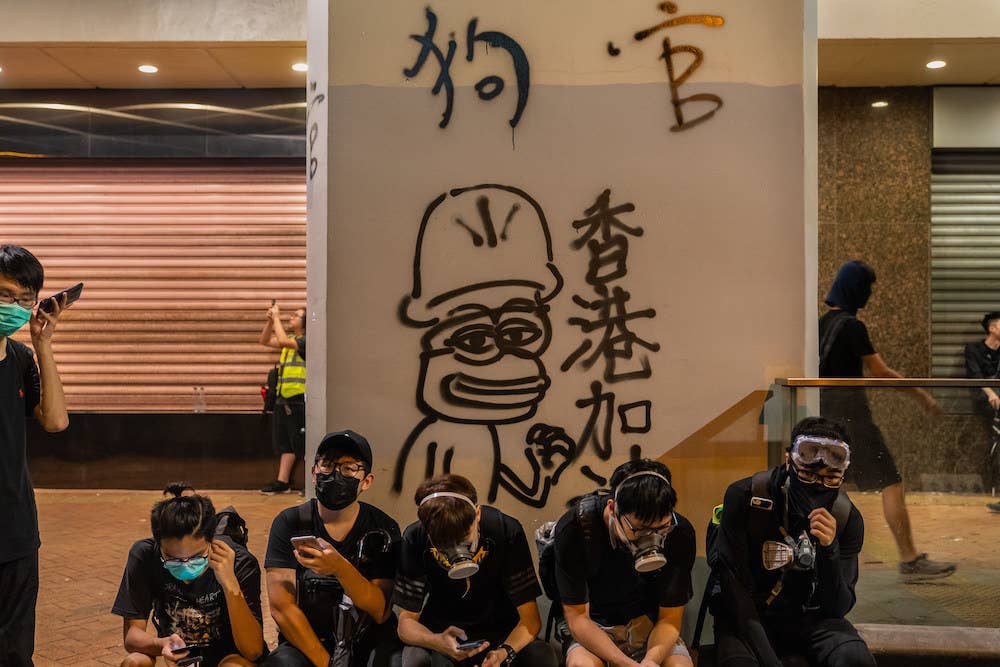
Last month, crowds snaked their way down a tiny side street of Hong Kong’s hip Sheung Wan neighborhood as people lined up to get inside a small bike store hosting a Pepe the Frog pop-up shop. You could buy Pepe T-shirts, socks, phone cases, and stickers. Online, however, rumors swirled —accusing the shop of being connected to a shady mainland Chinese Amazon storefront, diluting the revolutionary iconography of Pepe with tacky garbage.
But in the United States, the struggle over the meaning of the cartoon character Pepe, first created in 2005 by cartoonist Matt Furie, is split between white nationalists and meme enthusiasts, while in China, his double life is between an apolitical mainland Chinese emoticon and a pro-democracy mascot in Hong Kong.
After the frog went viral last summer as a symbol of the city’s protest movement, bootleg Pepes, knockoff products featuring the cartoon frog, have been a common sight in Hong Kong’s open-air markets.
Pepe is a regular fixture at the #antiELAB pro-democracy protests and in graffiti around the city, which exists as a special administrative region of the People's Republic of China with its own governing and economic systems. The frog is so important as a revolutionary icon that some businesses have put up pictures of him in their windows to signal their support of the protests — and some businesses that haven’t have been vandalized.
Was this Pepe store a nefarious tactic by the Chinese government to undermine the protests? A mainland company trying to profit off their newfound symbol of resistance? A cash grab from Furie?
It turns out the Pepe pop-up wasn’t actually any of those things. Instead, it appears to have been a politically insensitive stunt from a Hong Kong–based PR firm.
As the protest movement enters its seventh month, the city’s activists have resisted fracturing apart. But the struggle over Pepe in Hong Kong reveals a city on edge, in which even a cartoon frog is cause for suspicion.
Pepe’s dual life as a symbol of the pro-democracy movement in Hong Kong and a quirky-but-apolitical meme on the mainland encapsulates the cultural tension between mainland China and Hong Kong. As protesters challenge Hong Kong’s “one country, two systems," this is what happens when there’s one frog meme, two meanings.
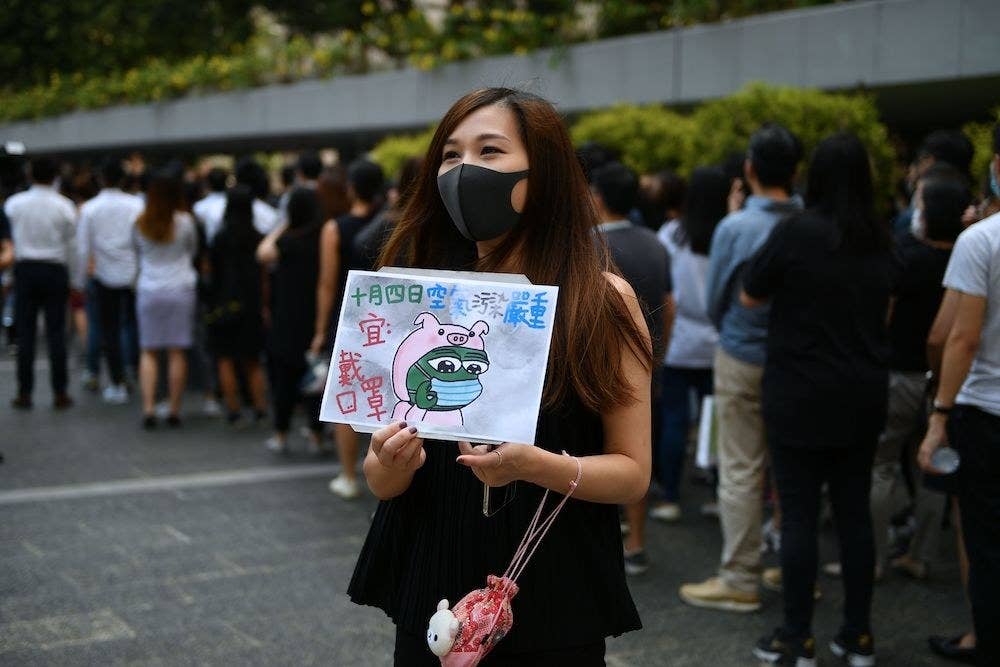
The Pepe pop-up followed the installation of a new police chief and a peaceful six-month anniversary march of an estimated 800,000 Hong Kongers in early December. But that calm was relative — on the second day of the store’s four-day run, police clashed with pro-democracy protesters less than a mile away. Tensions in the city are high. Local businesses are being categorized by which side they’re on — yellow businesses support the city’s protest movement and blue ones support the police.
Nothing about the promotion of the Pepe pop-up made it seem as though it had anything to do with the protest movement. The website for the pop-up doesn’t offer much information. Its domain was registered in Panama and links to a Facebook and sparsely populated Instagram page. The promotional text is decidedly apolitical.
“Everyone has a great story. Same as Pepe,” the website reads. “While you’re living a tough life, Pepe serves as a genuine reflection of your true self — someone who is poor and gloomy, someone who smirks with cunning thoughts, someone who is mad with your arms held up, and someone who is eager for the meaning of life while reading a book.”
“I guess you can say [Pepe] shares the sense of powerlessness that the Hong Kong people feel,” they said.
Concern about the Chinese Community Party or Chinese nationals working in the party’s interest had precedent. Only weeks before the Pepe pop-up, the LIHKG messageboard — Hong Kong’s equivalent of Reddit — was attacked by a Chinese cyberweapon. Members of China’s nationalist messageboard Diba regularly go on “battle expeditions" across the Great Firewall to spread pro-CCP propaganda. Recently, LIHKG users doxed a group of Diba trolls, leaking their identity card numbers, bank records, and home addresses.
Any hint that the movement’s mascot could be co-opted is being taken seriously. The moderator of the Hong Kong–based Rare Pepe Party Facebook page explained to BuzzFeed News why.
“I guess you can say it shares the sense of powerlessness that the Hong Kong people feel,” they said.
The 25-year-old moderator, who wished to remain anonymous, said that Pepe has been a fixture on Hong Kong social media since at least 2014.
“I created this page for fun back in 2015, while progressive groups like the Hong Kong Indigenous were using Pepe in their flyers and on social media around the same time,” they said.
The problem with young Hong Kongers turning Pepe into a protest symbol, however, is that he’s also been a huge meme on Chinese social media for almost a decade. And because of that popularity — and due to China’s long history of intellectual property theft — Pepe bootleg merchandise is all over.
The moderator of the Rare Pepe Party page said they’ve seen all kinds of Pepe merchandise on Taobao, an online marketplace owned by Alibaba: plushies, phone cases, and stickers.
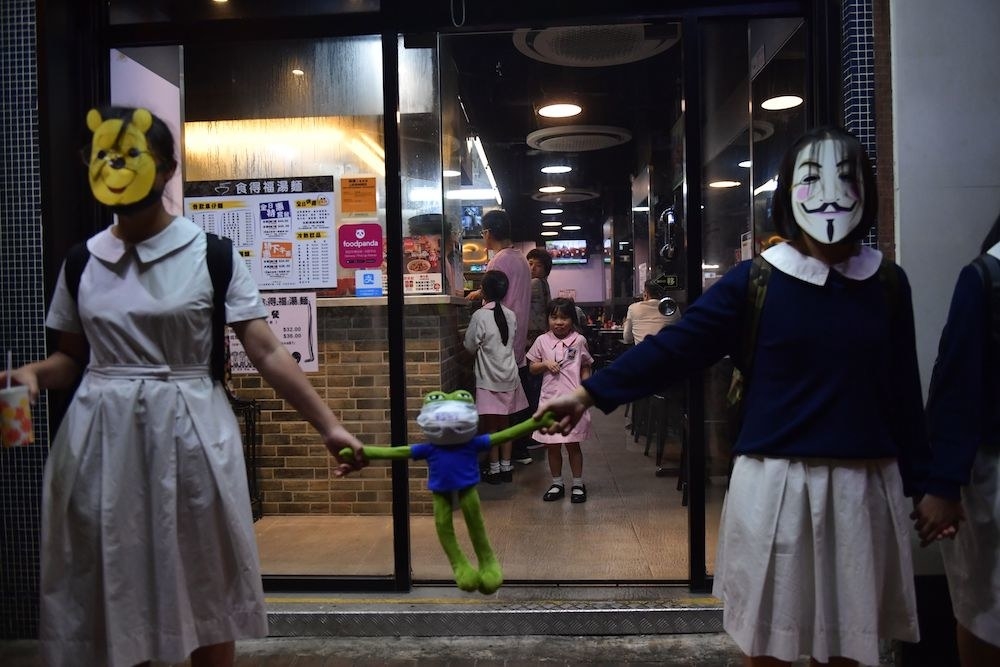
Gabriele de Seta, a social anthropologist of media based in Italy who studies China’s memes, told BuzzFeed News that he’s also seen every type of Pepe bootleg in marketplaces across China, Hong Kong, and Taiwan.
“I've seen all kinds of stuff. Plush Pepe eyes, like a sleeping mask, all kinds of stickers for smartphone cases, napkin holders shaped like Pepe's head,” he said. “Obviously, it's all made-in-China stuff.”
Unlike Hong Kong’s social media, which tends to run in tandem with Western internet culture, China’s meme universe is an insular one where Rage Comics — the early-2010s meme involving cartoon caricatures making fun of everyday problems — lived on, instead of dying out. Because of this fascination with Rage Comics, many early Reddit and 4chan memes have had full and different lives in China. In Mandarin, Pepe’s name is “the sad frog" (伤心青蛙) and he’s regularly used in a type of humor called sang (丧), or funeral culture.
“Other examples are like Wojack, the Sad Guy,” said de Seta said. “He's also as popular as Pepe in China,”
Instead of the nonlinear multiplatform osmosis that memes in the West go through, China’s meme cycles tend to flow in a more peer-to-peer way, largely in the form of ironic reaction images, called “biaoqing" (表情), or facial expressions.
“In China it was just seen as a funny face,” de Seta said. And that face, though not political like Winnie the Pooh, is valuable intellectual property.
Adding to the suspicion around the pop-up, people on LIHKG stumbled across a report from a Chinese company called Xi'an Momo Information Technology Co. Ltd, announcing they were licensing Pepe’s trademark from Furie in mainland China. Xi'an Momo is the parent company of Baozou Manhua, a Chinese digital media company that began as a Rage Comics aggregator in the early 2010s.
One LIHKG user called the Pepe pop-up shop a “blood steamed bun" (人血饅頭), a reference to a Chinese folktale about using human blood as medicine — exploitation, basically.
According to googling by pro-democracy activists on LIHKG, a company called KKONES, which also offers inflatable swimming pools, party favors, and toys, sells Pepe merchandise in the US on Amazon as part of their “hashtag collectibles" collection. The KKONES trademark is owned by Shenzhen Weizhike Technology Co., Ltd, which is registered as a business in Colorado by Colorado Registered Agent, which declined to provide BuzzFeed News with any information. The KKONES trademark is owned by Ye Li Fang, who has 1234 trademarks with the United States Patent Office, and lists an address in Shenzhen, a city on the mainland.
That address set off alarm bells inside LIHKG and on #antiELAB Facebook groups. One LIHKG user called the Pepe pop-up shop a “blood steamed bun" (人血饅頭), a reference to a Chinese folktale about using human blood as medicine — exploitation, basically.
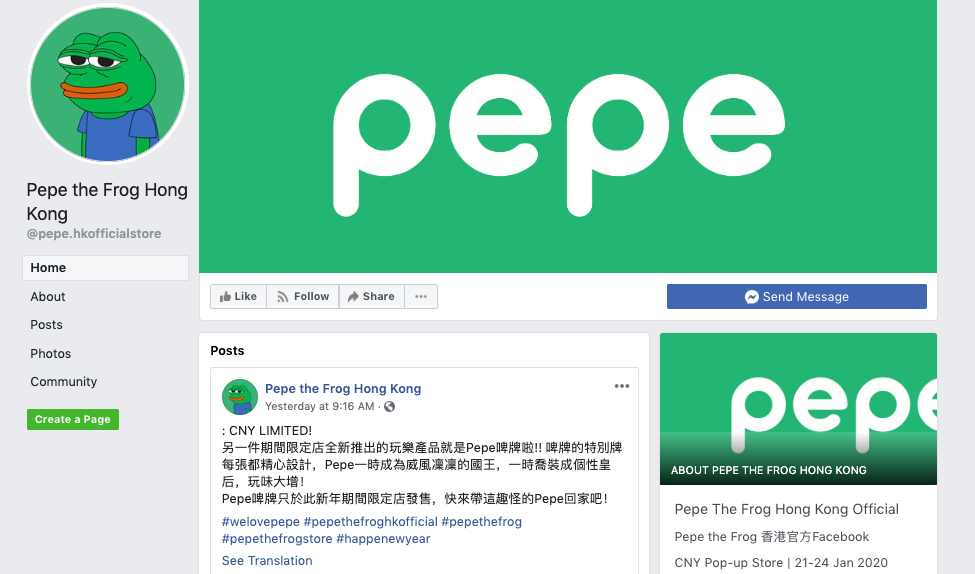
Members of the Hong Kong protest movement are protective of their version of Pepe. They refer to the meme’s creator as “Matt" in posts. An email supposedly from Furie endorsing the Hong Kong protesters’ use of Pepe went viral on Facebook in August.
BuzzFeed News has not been able to confirm its accuracy. Furie, who has grown reticent about talking to the press, declined to comment.
Since Pepe was appropriated by white nationalists during the 2016 US election, Furie has tried to contain the meme in the US via copyright takedowns. In June, Alex Jones’ far-right news channel Infowars settled a copyright lawsuit with Furie, paying him $15,000 and agreeing to stop using the image. But Furie has reached deals to allow the authorized sale of Pepe merchandise internationally.
Furie’s lawyer, Louis Tompros, told BuzzFeed News that he wasn’t sure which parties in China or Hong Kong were licensees of the Pepe copyright, nor was he aware of the recent pop-up shop. But he did say that licensing deals had occured in Hong Kong. “There is a licensee in Hong Kong,” Tompros said. “I don't know whether that store is related to the licensee.”
“It wouldn't surprise me if they were selling unauthorized things,” Tompros said.
None of the items for sale at the pop-up are explicitly political. They feature a placid looking Pepe smiling, without any of the Hong Kong–specific details typically used with Pepe during demonstrations, like a bloody eye patch or yellow hard hat.
On Dec. 17, moderators of the pop-up shop’s Facebook page tried to get ahead of “blood steamed bun” accusations with a post titled “Serious Statement,” written in English and Cantonese.
“As early as early in 2019, we were authorized to open the pepe the frog store in Hong Kong and were authorized to produce the product of the product of Pepe the frog,” it read. “The products for Pepe the Frog are fully designed by a Hong Kong team and approved under our international license.”
But the post did little to tamp down fears of exploitation of the city’s beloved frog meme.
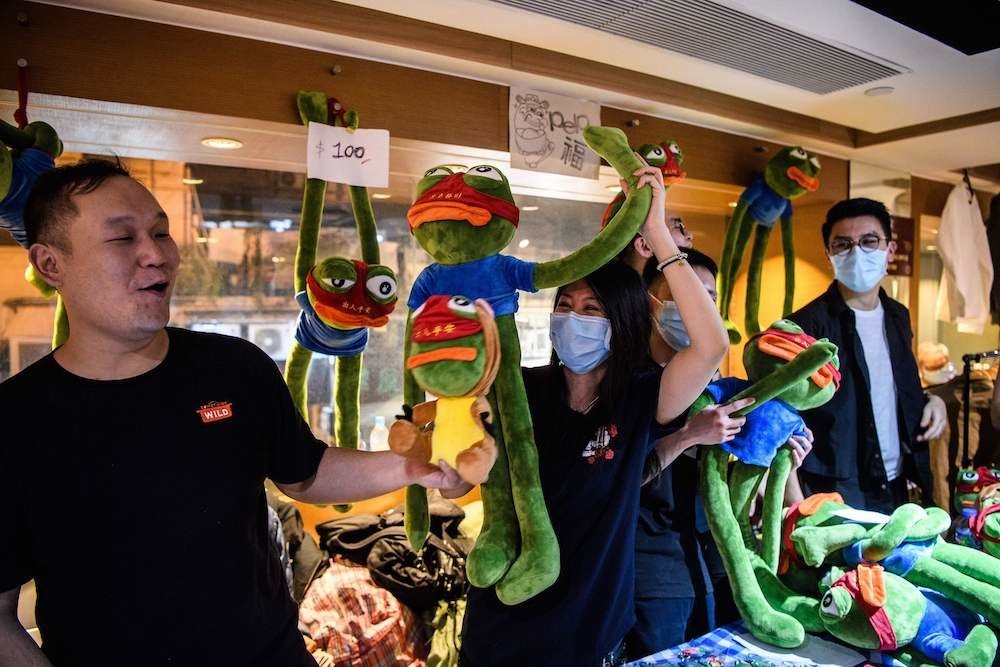
The suspicions around the Pepe pop-up were intense enough that an independent Hong Kong journalist, Jeffrey Ybanez, attempted to get to the bottom of it by hiring his own lawyer to look over trademark paperwork provided by Tang. He told BuzzFeed News everything appeared to be legitimate.
“Every time they claimed something during the interview, I asked the lawyer to read the documents that they provided to verify that it was solid proof,” he said. “I didn’t have the time and money to find more.”
A moderator for the pop-up shop’s Facebook page directed BuzzFeed News to a firm called Best Crew PR. Best Crew’s domain name is registered in Hong Kong and their Facebook and Instagram profiles are full of glitzy photos from events around the city. Photos from the Pepe pop-up, however, are noticeably absent.
Diana Tang, a spokesperson for Best Crew PR, told BuzzFeed News that they were the ones behind the pop-up and that everything they sold was officially licensed from Furie.
“I guess you can further check with the Hong Kong Customs and Excise Department. We already registered and confirmed with them as the only exclusive official licensed partner of Pepe the Frog in Hong Kong,” Tang said.
This week, Hong Kong celebrates Lunar New Year and the protests will be a prominent theme this year at bazaars and marketplaces. Best Crew plans to bring Pepe as well. On Monday, the store’s Facebook page woke back up after a month of dormancy. It announced it would be emailing out preorder information and launching a new pop-up in Hong Kong’s Soho Yard Gallery.
“Hello world, I’m back,” the post reads. “Are you ready for Pepe? What kind of weird character will pepe become this new year?”
